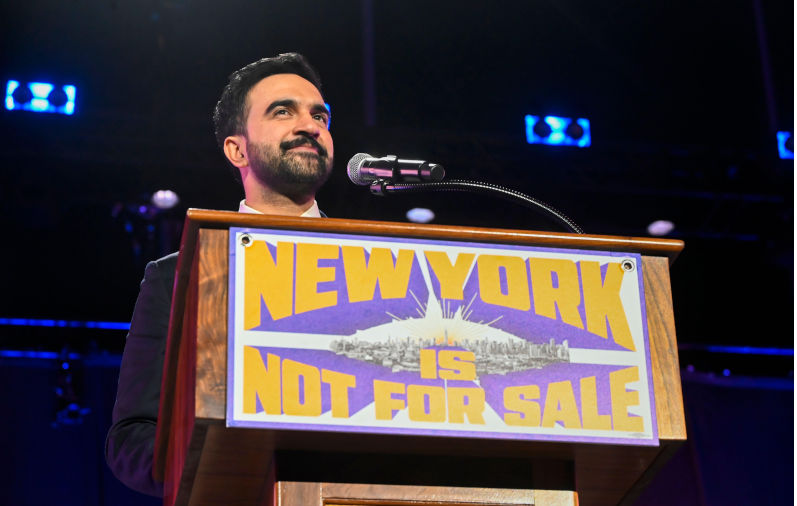The coming class war against Zohran Mamdani
November 12, 2025
Zohran Mamdani’s win in New York City should be seen as a repudiation of everything the Democrats have been doing since the DNC shafted Bernie Sanders to get Hillary Clinton and Joe Biden nominated as the party’s presidential candidates in 2016 and 2020.
It was also a rejection of Biden’s and Kamala Harris’s reflexive support for Israel’s genocide in Gaza, although that was a specific illustration of a much broader problem: the corrupt and rotting Democrat carcass now stinks too much for young progressives to embrace it.
Mamdani is popular because he doesn’t act or sound like an old guard Democrat insider who has stubbornly refused to make way for the next generation. Like the succession of aged communist leaders in the Kremlin whose time eventually came only because they had outlived their rivals, the refusal to dump Biden until it was too late proved that party leaders placed loyalty to their coterie over the interests of those who wanted a viable alternative to Donald Trump.
Chuck Schumer, Nancy Pelosi, Hillary Clinton, Joe Biden, Barack Obama, Kamala Harris and assorted Democratic Party commissars form a cosy club which, at the federal level, controls entry and membership.
They exclude anyone even marginally to the left of centre such as Sanders no matter how popular they might be, and like many party apparatchiks in a duopoly, know that the electoral cycle will eventually turn towards them: all they need to do is hang in there for a little while longer. They are time servers.
In 2028, they will run against Trump’s record no matter who the Republicans nominate, rather than propose policies that their constituents actually want implemented. If successful, they will claim vindication before realising they have little, if anything, to offer.
Even after Mamdani’s stunning victory and the revivification of the young Democrat base, neither Schumer nor Pete Buttigieg could bring themselves to endorse the mayor-elect or even admit they supported his candidacy. Being on a unity ticket with Wall Street and supporters of Israel’s genocide in Gaza, Mamdani is their worst nightmare.
They despise his grassroots politics, preferring to pander to powerful interest groups and wealthy donors. They hate his “democratic socialism” and “anti-Israel” stance because they are increasingly popular policies which won’t expand their already bulging share portfolios. And they are livid that he has exposed how out of touch they have become with their own constituents and their needs. In one way or several, we are all paying a heavy price for their narcissism.
Mamdani’s opponents threw everything at him – antisemitic smears, Islamophobic bigotry, 9/11 tropes, Cold War Marxist scare campaigns, claims of a mass exodus from the city and lots of money from billionaires who are accustomed to getting their way in the city. Surprisingly, it didn’t work. Assuming Mamdani refuses to compromise his principles and doesn’t sell out or get captured by their money and power, we should expect an intensified class war to discredit both him personally and the ideas he espoused to get the keys to city hall.
How will they do this?
In what has been called the “age of counter-revolution” it is important to understand that Mamdani is attempting to take power from the masters of class warfare who are used to winning and have no intention of surrendering under any circumstances.
As Norman Finkelstein has argued, Mamdani’s first sin was to break the rule that the ruling class preselects the pool of candidates from which the general population can choose their mayor. He wasn’t pre-approved by the usual suspects in the Democratic Party organisation: the normal filtering system failed. This partly explains the vicious personal attacks by rival candidate Andrew Cuomo, echoed and bankrolled by billionaire financiers and Israel firsters.
Wall Street, which invented moral hazard and regularly relies on federal government bailouts to keep its enterprises “private” and protected from greed-driven financial crises, could engage in a capital strike and temporarily tank the stock market to “prove” that socialism doesn’t work at the centre of world capitalism - at least for others, not them. The fact that much of the US economy is state capitalist, with a long list of concessions to socialism, shouldn’t be mentioned in polite company. He may be unable to do much about their eternal quest for financial deregulation and lower taxation, but at least Mamdani doesn’t owe them.
Despite widespread revulsion at the slaughter in Gaza, attempts to restore free speech at New York’s universities will be attacked by a compliant media as pandering to extreme antisemitism and making campus life “unsafe” for Jews. Expect false flag operations, bizarre disinformation about the introduction of sharia law and wild distortions of reality, all designed to discredit Mamdani and his policy agenda.
It is difficult to see how his organisational structures will withstand the inevitable onslaught. The resources and power confronting him are almost unlimited, from Wall Street, the White House and well-resourced lobby groups like AIPAC, to a hostile media, landlords and the NYPD.
His supporters might have to take to the streets and quickly rebut the lies, distortions and threats which will come at them before they become conventional wisdom. Editors from the Bezos-owned The Washington Post got in early by inverting reality: “A new era of class warfare has begun in New York, and no one is more excited than Generalissimo Zohran Mamdani.” This is just the beginning.
As Warren Buffett reminds us, “there’s class warfare all right, but it’s my class, the rich class, that’s making war, and we’re winning". Despite the charisma, confidence and intelligence of the newly elected mayor of New York City, it is difficult to see Buffett having any reason to revise his perspicacious view any time soon.
The views expressed in this article may or may not reflect those of Pearls and Irritations.


